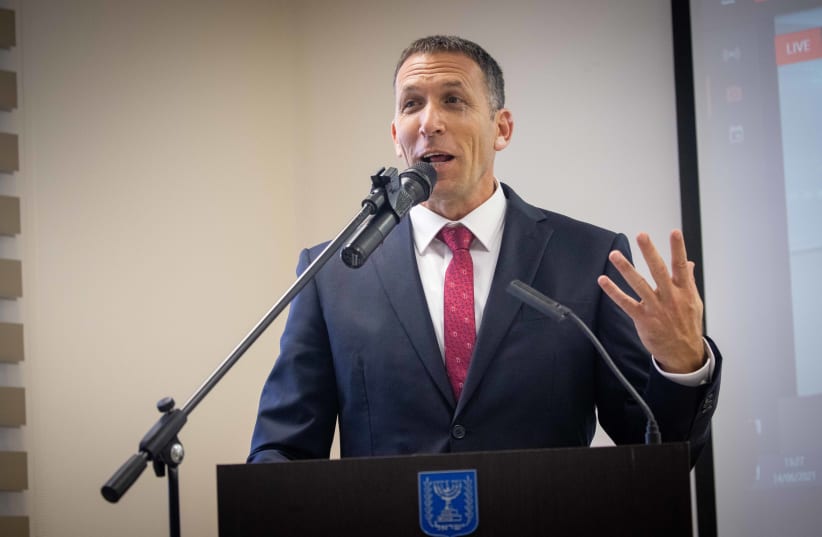Religious Services Minister Matan Kahana dashed hopes on Wednesday that the Western Wall agreement will be fast-tracked following the recent disturbances at the egalitarian section of the site.
On Saturday night, the beginning of the Ninth of Av Fast, a large group of hardline religious-Zionist activists took over the egalitarian section of the Western Wall reserved for non-Orthodox, mixed-gender prayer; set up a mechitzah (partition); and made it very difficult for a group of Conservative worshipers to conduct their services.
The incident generated outrage and protest from the Masorti (Conservative) and Reform movements in Israel and numerous centrist and liberal politicians – as well as objections from Jewish organizations abroad – and calls to fast track the Western Wall agreement approved in 2016 but indefinitely suspended the following year due to ultra-Orthodox pressure.
The agreement would create a holy site recognized by the government where the egalitarian section is currently located, physically upgrade the site and give non-Orthodox representatives a place on the site’s governing body.
Asked by The Jerusalem Post on Wednesday whether the plan would be fast-tracked in light of recent events, Kahana said “it is not on my to-do list for the next two months,” adding that the government was focusing first on passing the state budget.
Earlier on Wednesday, the Knesset plenum heard an urgent motion submitted by Labor MK and reform rabbi Gilad Kariv regarding the disruption at the egalitarian section on Tisha Be’av.
“Even today we let the extremists and zealots among us dictate the agenda on issues that should be decided through broad consensus,” said Kariv during the plenum debate.
“If there is a lesson from the event of the destruction [that happened to] the Jewish people which we should take, it is the need not to allow these elements a veto right.”
Kariv said that in “the coming months” the government would have an opportunity to “return the Western Wall agreement to the agenda and properly regulate the right to egalitarian worship at part of the Western Wall.”
United Torah Judaism MK Meir Porush said in response that the Western Wall is the remnant of the Temples, and recalled his late father, a former MK, standing at the Knesset podium and showing how the Reform movement removed the word Zion from their prayer books – although this action was later reversed.
“Why do the Reform want to go to the Western Wall? To build Jerusalem and Zion?” demanded Porush.
“The goal of the Reform is to goad the ultra-Orthodox and religiously traditional community, who believe in the return of God to Zion and Jerusalem,” said the MK.
“My father did the right thing when he threw the Reform prayer book on the floor and spat on it,” he added.
The actions of the hardline religious-Zionist group that night have been criticized abroad as well, with the Rabbinical Council of America, the mainstream modern-Orthodox rabbinical association in the US, speaking out against the incident on Tuesday.
“The Rabbinical Council of America, the leading membership organization of orthodox rabbis in North America, avows that expressions of disagreement, especially in matters of religious principle, should be voiced with respect and dignity, and therefore regrets the uncivil disruption by Orthodox Jews of Tisha Be’av observances at the Kotel this week,” the organization said.
And on Monday, the Conference of Presidents of Major American Jewish Organizations said it was deeply concerned by the development.
“The Talmud tells us that in the days leading up to the destruction of the Second Temple, the Jewish people were divided into rival factions, and because of this lack of unity, the Second Temple was lost,” said senior conference chairwoman Dianne Lob, chairman CEO William Daroff, and vice chairman Malcolm Hoenlein.
“The Kotel is our collective holy space,” they said. “We must remember the great importance of standing together as Jews in the face of this desecration.”
“The Talmud tells us that in the days leading up to the destruction of the Second Temple, the Jewish people were divided into rival factions, and because of this lack of unity, the Second Temple was lost,” said senior CoP Chair Dianne Lob, Chair CEO William Daroff, and Vice Chair of the Conference of Presidents of Major American Jewish Organizations Malcolm Hoenlein.
“The Kotel is our collective holy space. We must remember the great importance of standing together as Jews in the face of this desecration.”
